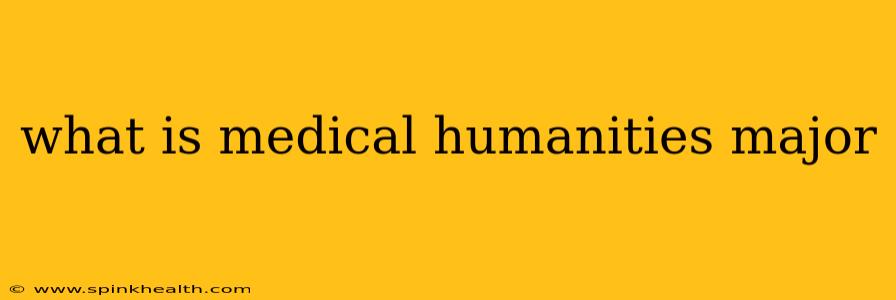What is a Medical Humanities Major? A Journey into the Heart of Healthcare
The world of medicine is often perceived as a realm of science and technology, dominated by precise diagnoses and cutting-edge treatments. But what about the human element? That's where a medical humanities major comes in. It's not just about scalpels and stethoscopes; it's about understanding the intricate tapestry of human experience that intertwines with illness, healing, and the very nature of being a caregiver.
Imagine this: You're not just memorizing anatomical diagrams; you're delving into the literature that explores the profound impact of disease on individuals and society. You're not just learning about surgical techniques; you're examining the ethical dilemmas that arise in medical practice. You're not simply studying the biology of the body; you're considering the social, cultural, and historical forces shaping healthcare systems. That's the essence of a medical humanities major.
This interdisciplinary field blends the rigorous study of the humanities—literature, history, philosophy, ethics, and the arts—with the complexities of medicine and healthcare. It's a journey of exploration designed to cultivate empathy, critical thinking, and a deep understanding of the human condition within a medical context.
What Courses Might I Expect?
A medical humanities major typically offers a diverse curriculum. You'll likely encounter courses like:
- Medical History: Exploring the evolution of medical practices, treatments, and ethical considerations throughout history. Think about the impact of the plague, the development of anesthesia, or the changing understanding of mental illness.
- Bioethics: Delving into the moral and ethical quandaries faced by healthcare professionals, patients, and families. Consider debates surrounding end-of-life care, genetic testing, or organ donation.
- Medical Literature and Film: Analyzing how literature and film portray illness, suffering, and the doctor-patient relationship. Think of novels exploring themes of disability, or films depicting the emotional toll of medical practice.
- Philosophy of Medicine: Examining fundamental questions about health, illness, and the nature of medical knowledge itself. What constitutes a "cure"? What is the meaning of suffering? What are the limits of medical intervention?
- Arts in Healthcare: Exploring the role of art, music, and creative expression in healing and patient well-being.
What are the Career Paths for Medical Humanities Majors?
While a medical humanities major might not directly lead to a medical license, it opens a wealth of opportunities:
- Medical Writing and Journalism: Communicating complex medical information to a broader audience, contributing to health-related publications or working as a medical journalist.
- Bioethics Consulting: Offering expert advice on ethical dilemmas arising in healthcare settings.
- Healthcare Administration: Managing healthcare facilities and systems, bringing a humanistic perspective to administration and patient care.
- Public Health: Working to improve the health and well-being of communities, incorporating a nuanced understanding of social and cultural factors influencing health outcomes.
- Medical Education: Teaching and mentoring future healthcare professionals, fostering their empathy and critical thinking skills.
- Health Policy Analysis: Studying and evaluating healthcare policies, considering their impact on individuals, communities, and the healthcare system as a whole.
Is a Medical Humanities Major Right for Me?
If you're passionate about both the scientific aspects of medicine and the human experience, a medical humanities major might be an ideal fit. It requires a strong interest in critical thinking, reading, writing, and a desire to make a difference in the lives of others. This is a field that values compassion, empathy, and the ability to see the bigger picture—a perspective that's invaluable in the world of healthcare.
What skills will I gain?
A medical humanities major will equip you with a unique blend of skills highly sought after in many professions:
- Critical thinking and analytical skills: Analyzing complex ethical dilemmas and considering multiple perspectives.
- Strong communication skills: Articulating complex information clearly and effectively, both orally and in writing.
- Empathy and compassion: Understanding and responding to the emotional needs of patients and colleagues.
- Interdisciplinary thinking: Connecting seemingly disparate fields to gain a comprehensive understanding of complex issues.
- Research and writing skills: Conducting independent research and presenting findings in a compelling manner.
In conclusion, a medical humanities major offers a fascinating and rewarding path for those seeking a deeper understanding of the human condition within the context of healthcare. It's a field that fosters critical thinking, empathy, and a lifelong commitment to improving the human experience of illness, healing, and well-being.

